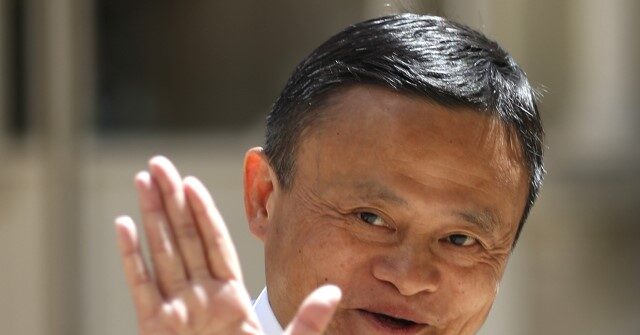China’s Alibaba Group announced on Tuesday that it will split up into six different units, a dramatic restructuring for the tech giant undertaken shortly after founder Jack Ma returned to China from a year of overseas exile.
Alibaba lost about 70 percent of its share value after Ma criticized the Chinese Communist Party at a forum in Shanghai in October 2020. The regime carried out a major crackdown on other high-flying tech firms as well.
Ma, who was once considered the richest man in China, disappeared completely for a few months as his net worth was decimated, reappeared as a much-chastened figure for a few subdued events, and then left China for a year-long exile that saw him eventually settle in Japan.
The regime in Beijing appeared to have made its peace with Ma as long as he kept a low profile and stayed out of China – which made his reappearance last week in first Hong Kong and then Hangzhou, the city where Alibaba is based, something of a surprise. Sources within the Chinese Communist Party said Ma returned at the invitation of Premier Li Qiang, who was desperate to rebuild China’s business-friendly image after years of lockdowns and crackdowns.
Analysts told Reuters the breakup of Alibaba, by far the most dramatic restructuring in the company’s quarter-century history, might be intended to “ease scrutiny” by making the immense company less of an inviting target for Chinese regulators – and for American regulators, who have been increasingly suspicious of big Chinese firms like Huawei and ByteDance, the owner of TikTok.
“By paving the way for Alibaba’s various new units to list, the Chinese government may be signaling less hostility towards its tech giants as a placatory message to U.S. and international investors,” NWI Management hedge fund analyst Tara Hariharan told Reuters, possibly also explaining why Very Bad Man Jack Ma was suddenly allowed to return from the cornfield.
“It does seem something of a coincidence that this is happening just as Ma seems comfortable returning. To me it suggests something that Alibaba has been wanting to do for some time, but has been waiting for the opportunity,” Equity Capital macroeconomist Stuart Cole agreed.
According to Alibaba CEO Daniel Zhang, the breakup is intended to “make our organization more agile, shorten decision-making links, and respond faster.”
Zhang, who plans to remain CEO of a parent Alibaba Group that will now operate more like a holding company, said he wanted every employee to “return to the mindset of an entrepreneur.” He also implied the reorganized company would “lighten and thin” its staff, but did not specify any planned job cuts.
Alibaba regained a remarkable $32 billion in market value in a single day after announcing its breakup, which analysts took as a sign that more Chinese mega-corporations would adopt similar restructuring strategies, to reassure both the paranoid Communist regime and nervous foreign investors.
“Alibaba’s break-up appears to have been orchestrated by Beijing, along with Jack Ma’s sudden reappearance. The business unit separation does not seem to result from a strategic impetus, but looks to have deep potential upside for shareholders,’ Kaiyuan Capital managing director Brock Silvers said on Wednesday, seemingly convinced the Alibaba rally was more than a temporary blip.


